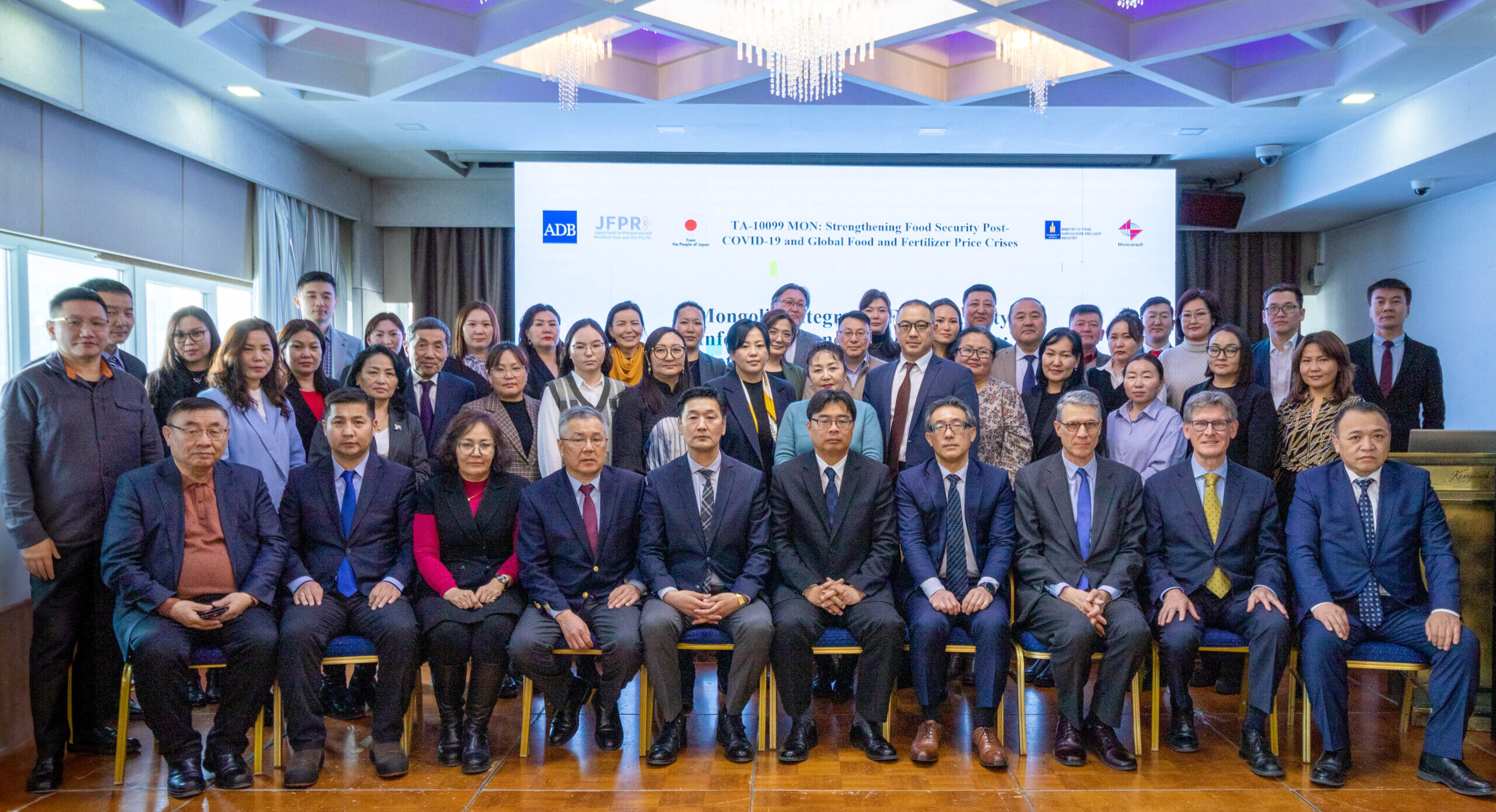SEMINAR ON “IMPROVING MEASURES FOR ENSURING FOOD SECURITY- MANAGEMENT OF FOOD STRATEGIC RESERVE”

TA-6584: MANAGING THE RISKS OF FOOD INSECURITY IN MONGOLIA DURING COVID-19 CRISIS – SEMINAR ON “IMPROVING MEASURES FOR ENSURING FOOD SECURITY- MANAGEMENT OF FOOD STRATEGIC RESERVE”
The Seminar on “Improving Measures for Ensuring Food Security- Management of Reserve of Strategic Food” was successfully held at Bishrelt Hotel on 25th September 2023 in Ulaanbaatar.
The seminar was organized by TA6584MON (Managing the Risks of Food Insecurity in Mongolia during COVID-19 Crisis) in close collaboration with Department of Food Industry Policy Coordination Department of the MOFALI.
The overall objective was to enhance the knowledge and capabilities of food and agriculture specialists, with a specific focus on:
- Supporting the implementation of Parliament Resolution 36, which outlines measures for ensuring food security and safety that includes enforcing standards and technical regulations across various domains such as animal husbandry, crop production, food industry, trade, logistics, and services, as well as adopting and implementing best practices and control and management systems within supply chains
- Presenting and discussing procedures and strategies for stockpiling seasonal strategic food reserves
- Providing information on food insecurity risks and vulnerabilities
- Providing information and engaging in discussions regarding the establishment of an Integrated Food Security and Safety Information System.
Participation:
A total of 70 participants attended the seminar, primarily comprising provincial food and agriculture officials, state inspectors for the food and agriculture sectors, including officials from the capital city, and MOFALI representatives responsible for food supply and food safety. A detailed list of participants is provided in Annex 1.
The Seminar was implemented according to the schedule and agenda (Annex 2); and was co-chaired by MOFALI (Mr. Dovchinsuren, DG Department of Food Industry Policy Implementation) and Ms. T. Enkhjargal (Team Leader, TA 6584 MON). All Presentations are attached The key topics discussed included:
- Food security risks and vulnerability – Institutional Gap
- Procedures and strategies for implementing seasonal stockpiling of strategic food reserves
- Methodological guidelines for calculating the balance of food supply and agriculture statistics in Mongolia
- The transition to digital solutions within the food and agricultural sector.\
- The establishment of an Integrated Food Security and Safety Information System.
- Supporting the local industry through public procurement
- Technical regulations governing the production and trade of meat and meat products.
- Considerations for food production inspections.
- The Integrated Milk Preparation System and milk incentives.
(PS: According to GoM new regulation, the milk incentive is increasing from 500MNT to 1000MNT per litre, and its eligibility extends beyond cow milk to encompass milk from other livestock such as goats and sheep.)
During the seminar, TA 6584 MON presented the findings and results of their study on Food Insecurity Risks and Vulnerability, while TA 10099 MON outlined the objectives of the new project aimed at establishing the Integrated Food Security and Safety Information System (IFSIRS) and shared initial findings and results.
Ms. Myagmarsuren from the National Statistical Office (NSO) delivered a presentation that provided additional information and insights to both participants and TA Projects for consideration during project implementation
Furthermore, provincial officials were invited to provide feedback on a questionnaire developed by TA 6584 MON, as detailed in the Annex 3.
CONCLUSION:
The seminar participants unanimously agreed that the training was exceptionally well-organized and provided valuable and practical information. The seminar includes the following recommendations:
- Regular training for food and agriculture specialists and food factory inspectors at the provincial, regional, and district levels, with a focus on international systems, trends, and advanced food safety technologies.
- Promoting a unified and accurate understanding of government policies and measures in the field of food production among relevant experts and the public.
- Enhancing cooperation among participants to ensure food security at the provincial and local levels.
- The necessity to supply industrially prepared meat for schools and kindergartens, with a future commitment to fully complying with the “Technical Regulations for the Production and Trade of Meat and Meat Products.”



